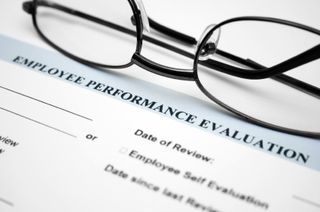You do not have to be over 21 to have experienced it. Nonetheless, the
likelihood is that if you are over 21 you almost certainly will have done so. It
would seem it is an inevitable part of adult life. Most organisations with about
ten or more people insist.
And the odds are that you will have found it an ordeal. That may, arguably,
be true of anything that is compulsory. In this instance, however, you might possibly
even question its value.
In case you haven’t already guessed, I am talking about the performance
review: that annual or semi-annual event that casts a shadow over everything
you do at work. It is rather like a cruel extension of your old school report
or, even worse, those awful, awkward parent-teacher evenings where your two
worlds collided and you had to introduce your parents to your much derided
teachers and then squirm as you suddenly became invisible and they became gods
who drilled down to dissect, diagnose and discuss every single mistake and
misdemeanour you had made during the past year, and why – unless you changed your
attitude and behaviour – you would never
amount to anything in life.
The performance review conversation may also be awkward, coloured by reserve,
stilted formality and abstract jargon where management-speak permeates the
conversation and causes confusion. As Yogi Berra once said, “It’s deja vu all
over again.”
Indeed the performance review might be more questioned than its widespread
adoption suggests. How about this? “In most companies, performance reviews
are a ridiculous process that does orders of magnitude more harm than it does
good.” Or this? “Managers have reported
that performance reviews are equal to or worse than firing employees.” And
perhaps even worse, “Most managers don’t even see any value in them?” Unfortunately
none of these has any attributed source.
Nevertheless, if managers and employees alike do find it an ordeal, it is an
institution that needs to be challenged. Especially with its inextricable link to
performance measurement. You only have to think for a moment how much resource
goes into this to question whether the return on investment (ROI) merits the
expense. There is:
- The time spent devising and developing new measures;
- The cost
of developing and implementing new systems to deliver them; - The cost of
analysing, verifying and validating the data produced; - The time spent reviewing
the data and determining and agreeing performance targets, and the linking of
rewards to those measures.
All that is necessary before you can even begin the
review itself.
You might, even now, consider it to be essential. Just think, however, of
the opportunity cost. Every minute and every cent that you spend on this might
otherwise be spent on improving your customer experience. Think what a
difference this could make to your ROI. Also, how much more time-effective you
personally might be. Thus you could say that performance measurement and
performance reviews are largely a waste of management time.
If you are still inclined to argue that you need to monitor your people, ask
yourself, “Why?” More often than not people are the best judges of their own
performance. Consequently your need to monitor and review their performance both
belittles your employees and is an indictment of your inability to manage
people properly. Thus your focus should not be on reviewing performance but how
best to engage employees so it isn’t necessary.

